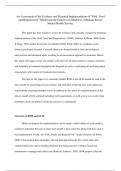Tentamen (uitwerkingen)
Course Assessment for Working With Client Groups, MSc Forensic Psychology
- Vak
- Instelling
This essay is from the Working With Client Groups module of the MSc Forensic Psychology taught at the University of Lincoln, UK. This essay was written to assess the evidence and critically evaluate the potential implementation of the ‘Risk, Need and Responsivity’ and/or the Good Lives Model in...
[Meer zien]




